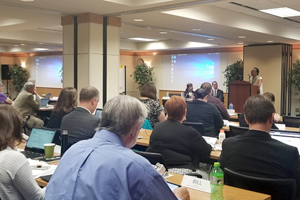
AACRAO International held its annual Symposium on Global Recognition on August 2, 2019, at the National Center for Higher Education. The Symposium provided a venue and opportunity to promote a conversation “grounded in the...understanding of the worldwide push for transparent and fair recognition of academic qualifications.”
As one participant observed, “The Symposium provided great insight on the U.S. current position related to the Global Convention on the Recognition of Higher Education Qualifications. The information and data presented provided a better understanding of student mobility and variations in credential assessments.”
The day was “a gathering of today's leaders in the international credential evaluation profession,” as one attendee noted. “The diversity of panelists from various countries, institutions, and organizations, both public and private, demonstrated a commitment of our profession in facilitating the recognition of foreign qualifications.”
Draft support
AACRAO’s official status as an observer at the first and second Intergovernmental Meeting on the Global Convention placed us in a unique position to further the conversation among our domestic colleagues regarding The Global Recognition Convention on Recognition of Qualifications for Higher Education. The approved draft of March 22, 2019, is a sound, well-crafted document. Its definitions and principles are important for international education and global mobility. As the US is no longer a member of UNESCO, the Convention is not one that the US will be able to adopt or ratify, though we can still support its basic tenets and offer a willingness to comply at an individual and an institution-wide level. (Read more here.)
The AACRAO Symposium brought together professionals familiar with the history of recognition and how increased mobility has spurred that discussion forward. Symposium attendees, hailing from all types of institutions, represented a variety of perspectives in credential evaluation.
“Each attendee brought their experiences and their legacy of engagement with international students and scholars,” as one participant commented, adding: “a wonderful day of discussions and coming together of the minds on a worthy topic! Among the attendees, there seemed to be existing agreement with the definitions and principles outlined in the Global Recognition Convention and that these were already fundamental to the work we do and how we do it.”
Clear communication
What remains imperative is for us to come up with a way to parse this out and communicate it both to our colleagues and fellow international educators as well as the global community. It is in the U.S.’s best interest to highlight the practices and procedures for admission to our education institutions. Such clear communication supports international mobility and conveys a readiness to engage with learners in the global marketplace.
It is clear from the text of the GRC that our global colleagues respect and understand the substantial differences between systems of education. Should we now formally consider creating a document which clarifies the Principles, Processes, and Responsibilities that guide our own interactions with international students and scholars?
AACRAO will continue to work on this -- we invite our colleagues to join and continue this conversation. Read more on our Signature Initiative page and click here to sign up to receive updates on the Global Recognition Signature Initiative.